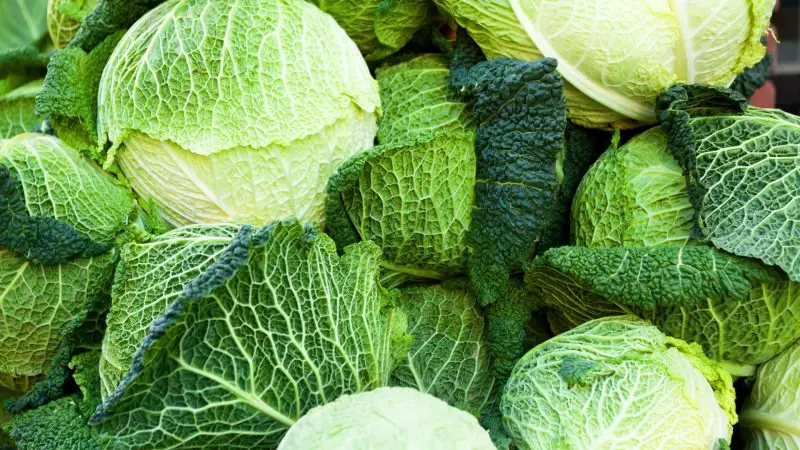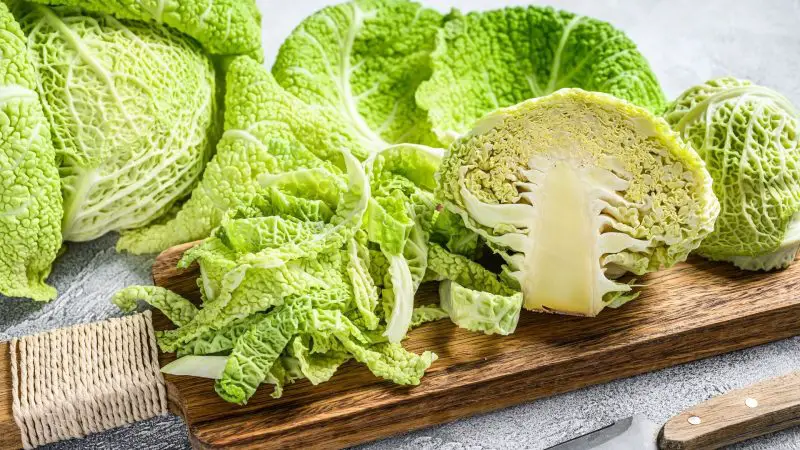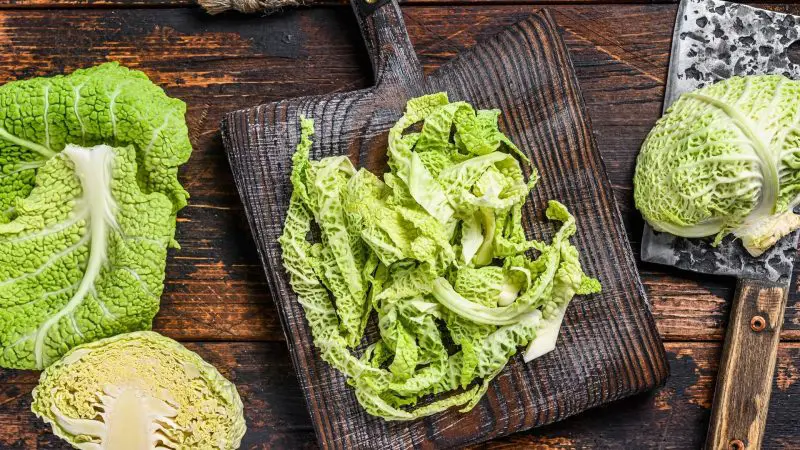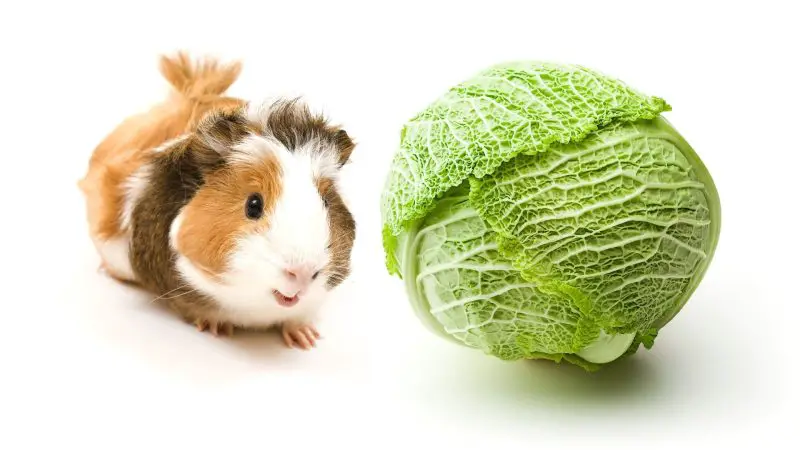Savoy cabbage is a variant of the cabbage plant and a winter vegetable. It is used for culinary purposes, and many animals enjoy savoy cabbage. The leaves of savoy cabbage are bright and fresh, and this type of cabbage is also massive in size.
Now that you have some information on this vegetable, let’s see if our cute little guinea pigs can eat this winter cabbage variant.
Can guinea pigs eat savoy cabbage? Guinea pigs can eat savoy cabbage. Aside from its fantastic taste, it is rich in nutrients, such as vitamin C, vitamin B, vitamin B12, fiber, sterols, and numerous antioxidants crucial to their well-being.
Guinea pigs will also love the texture of the savoy cabbage, which is crunchy and delicious.
This article will give you information on whether savoy cabbage is good or bad for guinea pigs, its benefits, nutrition, risks, and several quick facts. So keep on reading to know more!
Table of Content
Is Savoy Cabbage Good for Guinea Pigs? | Health Benefits

Savoy cabbage is good for guinea pigs. It is very important that you know what health benefits the savoy cabbage has on your cute little friend, and that includes the following:
Aids in Digestion
Savoy cabbage is filled with dietary fiber, which is very crucial to a guinea pig’s digestive system. Moreover, fiber helps absorb nutrients into the body and boosts the digestive system as a whole. This nutrient also helps in bowel movement and the prevention of constipation.
Excellent Weight Loss
Savoy cabbage is an ideal weight loss meal due to the low calories. Also, a dietary fiber present in the savoy cabbage helps boost satiety/fullness, hence reducing the overall intake of food by a guinea pig.
Prevents Diabetes
When the blood sugar is maintained at optimum levels, your guinea pig has a low chance of getting diabetes. The soluble fiber in savoy cabbage slows down digestion and maintains optimal blood sugar levels. High fiber intake prevents insulin resistance in the body.
Boost Cardiovascular Health
Savoy cabbage has nutrients such as vitamin B that aid in the maintenance of a healthy heart in guinea pigs. Vitamin B also helps reduce homocysteine levels in the blood, which is a known cause of heart attacks and other complications.
Folate is yet another vital nutrient needed by the heart, and it is present in savoy cabbage. This reduces the occurrence of cardiovascular diseases. It works hand in hand with vitamin B12 to protect your little pet against heart-related complications.
Absorption of Minerals
Vitamin C (present in savoy cabbage) helps absorb minerals such as iron, needed by the guinea pig.
Boosts the Immune Function
Due to vitamin C, the guinea pig will have an enhanced immunity, and it will be guarded against several diseases and infections.
Counters the Existence of Free Radicals
Due to metabolic processes, free radicals can occur in a guinea pig’s body. They can cause diseases and other complications in the body. Luckily, savoy cabbage has numerous antioxidants which can counter the existence of free radicals in the body of your guinea pig.
Prevent Inflammation
Inflammation is a normal reaction to diseases, infections, or injury. It fades away after some time, and it is nothing to worry about unless it becomes chronic.
Chronic inflammation is dangerous and can lead to several other complications in the body. Savoy cabbage has many nutrients, including vitamin C and other potent antioxidants that can reduce acute swelling in the body.
Lowering the Cholesterol Levels
Cholesterol is a waxy substance found in cells, and it can cause several complications if present in large amounts.
High cholesterol is linked to the increased chances of heart failure. Sterols and soluble fiber found in savoy cabbage reduce cholesterol in the guinea pig’s body.
Healthy Bones and Teeth
The calcium in savoy cabbage helps the guinea pig develop strong bones and teeth.
Nutrition Facts of Savoy Cabbage

Savoy cabbage is quite nutritious, per 100 g there is:
- Calories – 27
- Vitamin C – 51%
- Dietary fiber – 12%
- Calcium – 3%
- Potassium – 6%
- Vitamin B-6 – 10%
- Magnesium – 7%
- Iron – 2%
- Sugars – 2%
- Vitamin A – 20%
Serving Size and Frequency of Savoy Cabbage for Guinea Pigs

The serving size is one leaf or, when chopped in smaller pieces, one cup or handful. Knowing how often you can feed this veggie to your guinea pig is very important. Since savoy cabbage is filled with various nutrients, it can be administered twice or thrice a week.
Risks to Consider When Feeding Savoy Cabbage to Guinea Pigs

There aren’t many risks linked with the consumption of savoy cabbage except for the following:
Bloating
This green produces a lot of gas when consumed, which can cause immense flatulence. You can prevent this by offering your guinea pig sufficient water during the feeding process.
Acidity
The acidity in the savoy cabbage isn’t a huge health risk, but it can affect some guinea pigs negatively. Just give them enough water, and everything will be alright.
Quick Facts on Savoy Cabbage
These are some interesting facts about this veggie that you probably didn’t know:
- The savoy cabbage is similar to the ordinary one, only the flavor differs. Savoy cabbage has a milder flavor.
- Cabbage is one of the few vegetables with several entries in the Guinness book of world records.
- The cabbage has several other varieties with different shapes, leaf textures, and colors.
- Russians consume the highest amount of cabbages globally, followed by Belgium and the Netherlands.
- Cabbages can either be eaten raw or prepared in several other ways.
- China is the leading producer of cabbage, followed closely by India and Russia.
- The first cabbage to land in the USA was brought by a French explorer known as Jacques Cartier during his 3rd voyage.
With food, you should be careful what to choose. If you are not sure what to feed them but believe your little piggies deserve some great treats, check our Helpful Guide to the Best Guinea Pig Treats to get some ideas.
